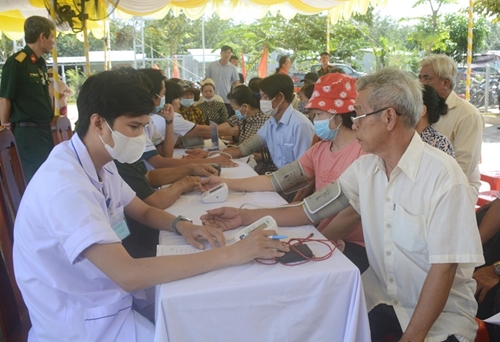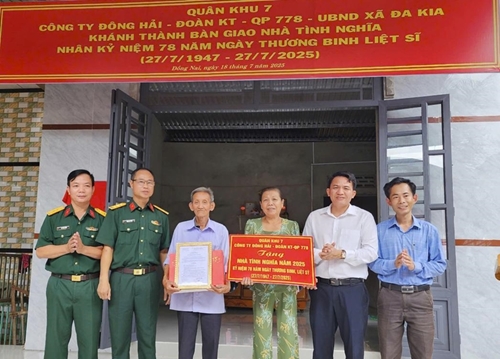Taking care of local people’s health
We recently accompanied Senior Captain Ka Sa Ha Ly, head of the military medical station of Defense-Economic Unit 778 under Military Region 7 to cross winding forest roads to Dak A village in Bu Gia Map commune, Dong Nai province, where over 70% of the 1,700 residents are ethnic minority people. Poor health awareness makes the area vulnerable to disease outbreaks.
    |
 |
|
MR7’s medical staff provide health check-ups for people in Thien Hung commune, Dong Nai province. |
At a mobile station, military medics provided health check-ups, medicines, and advice on disease prevention. “I used to walk over 7km for treatment. Now the doctors have come to us. They gave us careful health check-ups, advice and medicines,” said Dieu Thi Ka Ren, aged 64, from the S’tieng ethnic group.
“This regular mobile program has helped break barriers of geography and language,” said Senior Captain Ka Sa Ha Ly, adding that it has helped them understand local residents’ needs and win their trust.
Over the past five years, Defense-Economic Unit 778 has provided free medical care to more than 10,000 people. Notably, health coverage now reaches 100% of villages in defense-economic project areas.
Military Region 7 has expanded this successful model of Defense-Economic Unit 778 across the locality. MR7 has built 15 military-civilian clinics in remote and mountainous areas. It has also upgraded lower-level hospitals, and been pro-active in disease prevention and control.
To date, over 102,000 policy beneficiaries and disadvantaged people in the region have received free health check-ups and medicines, reinforcing people’s heart disposition and laying a foundation for local sustainable socio-economic development.
Giving sustainable livelihood support
Major General Tran Vinh Ngoc, Secretary of the Party Committee and Political Commissar of MR7, said that the ethnic communities play a key role in border protection but face hard living conditions. To support them, the Command has implemented a number of projects, such as building residential areas near militia posts in border areas, and promoting bonds and supporting ethnic and religious people to foster local residents’ close ties with their homeland.
    |
 |
|
Defense-Economic Unit 778 joins hands in presenting gratitude houses to policy beneficiaries in Da-Kia commune, Dong Nai province. |
Over the past five years, the Command has built 808 houses in 58 border residential areas, two preschools, over 2,000 homes for policy beneficiaries and impoverished people, and 150 cultural and sports facilities.
Effective models like “Presenting breeding cows,” “Paving the way to school for students,” and “Party cadres and members support the people” have been widely adopted. Since 2020, tens of thousands of troops have assisted local residents in production development, road building, new-style rural area building and joined efforts to strengthen grassroots political systems.
Senior Colonel Hoang Van Hung, Political Commissar of Defense-Economic Unit 778, shared that with their support, local residents have risen in life and enjoyed production development.
Dieu Thep, a S’tieng farmer in Dak O commune, proudly showed us his intercropped avocado-durian farming model. He happily said that with seedlings, fertilizer, and training from troops, his family now earn nearly VND 100 million a year. His household is among over 500 ones supported with livestock, fruit trees, and farming inputs. Thanks to these efforts, poverty rate in some border communes in Dong Nai province has fallen to under 1% in 2024.
Gen. Ngoc concluded that the greatest reward for the troops isn’t a merit certificate but the trust and affection of local residents for Uncle Ho’s soldiers. The models that the Command has carried out have not only consolidated people’s trust in the Party and State, but also shined the image of Uncle Ho’s soldiers in the new era.
Translated by Mai Huong